Compromises in politics are not just decent, they are practical. Drug reformers may be temped to view decriminalisation as a stepping stone to full legalisation and regulation, or as good enough by itself. This was presumably the mindset behind the Royal Society for Public Health’s (RSPH) call for decriminalisation of all drugs this week.
For recreational drugs from cannabis through to the most addictive, this would be a mistake. Decriminalisation is not substantially more achievable than full legalisation, and it risks poisoning the well of public opinion against further reform.
Like many people involved in the drugs debate, they may believe that the difference is trivial. But it is enormous: under decriminalisation, possession of small amounts of a drug for personal use is not a criminal offence, but you can still be arrested and fined or forced to attend ‘rehabilitation’ classes. The supply side is left unchanged – it is still only possible to buy drugs from an illegal dealer, and there is no control or regulation of products on offer.
Under legalisation, there is usually no penalty for possession, and the supply side is treated like any other regulated product – it is sold by licensed vendors who have to maintain strict quality standards and are usually harshly punished for selling to under-18s.
Decriminalisation has many benefits for drug users. It makes it easier for them to seek treatment without fear of punishment, and giving treatment to problem users is a more merciful, and effective, way of helping them than jail time. But it also carries drawbacks.
Street dealing, which is many non-users’ biggest objection to drugs, is unaffected at best, and may be made worse if police take decriminalisation as a sign to turn a blind eye to all drug-related crimes. Without the threat of jail time, demand for drugs may rise, drawing more dealers onto the streets. Anecdotally, I have never been offered drugs more regularly or aggressively than in Lisbon, and I am not alone in that experience.
The Portuguese experience with drug decriminalisation has been much-heralded but the evidence seems more mixed than some people believe. Glenn Greenwald’s 2009 study argues that drug use actually declined in many key groups, including among 15-19 year olds – which has often been misrepresented as saying that drug use fell overall. However, as described by a 2012 paper, different data sets produce different results.
Use by teenagers and problem users fell, but overall usage seems to have risen. Drug prices fell, in the case of heroin and ecstasy quite dramatically, either as a result of increased supply or (less likely in light of drug usage rates) because of lowered demand. Decriminalisation did not fail, but the picture is not as rosy as some believe.
[READ] Public Health Experts Urge Government to Decriminalise Drugs
The ‘Brixton experiment’ with partial decriminalisation led to a significant rise in street dealing, and a fall in property values – a proxy for quality of life in a given area. These quality of life losses were concentrated in areas where drug dealing was most prevalent. Some of this is due to displacement, but not all.
If decriminalisation fails to produce the results promised by drug reformers, the public will lose faith in them, and chances of further reform will be scuppered.
Mis-selling is risky in politics. Liberals made panglossian claims about free trade in the early 1990s, which did not turn out well for everybody. Advocates of EU expansion downplayed the numbers who would come to Britain, and were wrong. The current backlash against free trade and immigration in the UK must be understood in this context, and drug reformers should not make the same mistake.
It’s not clear that decriminalisation actually is much of a stepping stone, anyway. I am not aware of polling data that shows that the public makes a clear differentiation between what decriminalisation and legalisation are. The most extensive polling, conducted by Ipsos MORI for Transform in 2013, did not differentiate between the two.
Many highly informed people use the terms interchangeably. Perhaps I’m wrong, and large sections of the public who oppose legalisation are also very receptive to the idea of decriminalisation. But the public’s ignorance of other policy issues makes me suspect that here, too, people have an unsophisticated understanding of the drug debate.
If that is true, then decriminalisation is a risky distraction from legalisation, which risks wasting political capital on a half measure that does not reduce street dealing or under-18s’ access to drugs nearly as much as legalisation could. If these things become worse after decriminalisation, many people will judge the experiment to have ‘failed’, and full legalisation will be a non-starter.
The RSPH’s report does not consider legalisation as an option – indeed it only mentions it once, in the context of Canada’s current reforms. This is indicative of the problem with the public health approach to drug reform: decriminalisation may solve many of the problems that public health groups have with drugs, but it does not solve the problems that the public has with them – that they are an anti-social nuisance.
Legalisation is more attractive in this light because it gives us much more control over who buys drugs and where they can consume them.
A reform that ignores these issues, let alone one that exacerbates them, will prove to be one step forward, and two steps back. Decriminalisation may be a false compromise that satisfies nobody and ends up preventing the reforms that the drug market really needs.
Sam Bowman is Executive Director of the Adam Smith Institute. Tweets @s8mb


